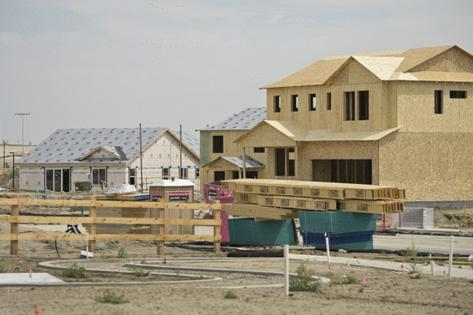Editorial: America's housing crisis is a job for Congress
Published in Op Eds
One of the many criticisms the president has levied against the Federal Reserve is that high rates are making it too expensive for Americans to buy a home. In fact, if affordability is the goal, he should be pressing Republicans in Congress to pass a new piece of bipartisan legislation that would do more to address the problem.
Sky-high housing costs are a top concern for many Americans. In the wake of the pandemic, median home sale prices reached their highest level in at least 50 years compared with household income; rents outpaced earnings as well. Relatively high mortgage rates — the 30-year fixed-rate mortgage rose to an average of 6.72% at the end of July, from 4.46% over the previous decade — have certainly contributed to the affordability crisis.
A bigger issue, though, is the persistent lack of supply. A slowdown in housing construction after the 2008 global financial crisis produced a shortfall of nearly four million homes, according to one estimate, which has only recently started to improve. Rent regulations and not-in-my-backyard zoning limits in cities such as San Francisco and New York have retarded needed development for years.
Traditionally, the help Congress has offered buyers — including subsidies and low-cost loans — has spurred demand, exacerbating these supply pressures. Some states and cities have recently begun easing zoning and land-use restrictions that limit housing development, which has boosted construction and lowered costs in places such as Austin and Minneapolis. But more is needed.
That’s what the 315-page Renewing Opportunity in the American Dream (ROAD) to Housing Act aims to address. The sprawling bill, which recently received unanimous backing from the Senate Banking Committee, would slash more of the regulations that impede homebuilding in the U.S. It would, for instance, streamline environmental reviews required for some federally funded housing construction. It would also eliminate the absurd requirement that so-called manufactured homes — otherwise known as mobile homes or trailers — be mounted permanently on a fixed chassis, which adds unnecessary costs and limits design flexibility.
Importantly, the legislation rewards communities for taking risks to build. Those that demonstrate a track record of accelerating housing development would receive larger federal block grants. A $200 million innovation fund directed at local governments is meant to promote creative approaches to increasing supply. A provision that would offer local governments federal help in developing pro-housing policies already has sponsors in the House.
The legislation can certainly be improved. Its 40 provisions are derived from 27 earlier bills, a case study in sausage-making. Too many simply burden federal bureaucrats with requirements for annual testimony, monthly reports and various studies. A bit of streamlining would limit administrative costs and focus agencies on the task of boosting housing availability.
Still, in an era of partisan and often ill-advised policymaking, the fact that 24 senators with profoundly disparate ideologies united to pass a worthwhile legislative package deserves to be celebrated. The legislation has garnered support from national organizations representing home builders, real estate agents, mortgage bankers and county governments, as well as the Bipartisan Policy Center.
The president ought to join their ranks and encourage his supporters in Congress to do the same. Passing the bill would be a step — even if a slightly wobbly one — in a better direction.
_____
The Editorial Board publishes the views of the editors across a range of national and global affairs.
_____
©2025 Bloomberg L.P. Visit bloomberg.com/opinion. Distributed by Tribune Content Agency, LLC.
























































Comments